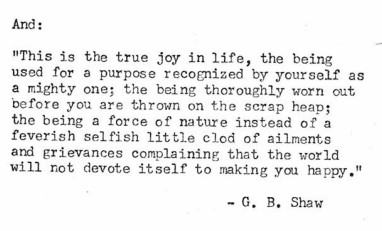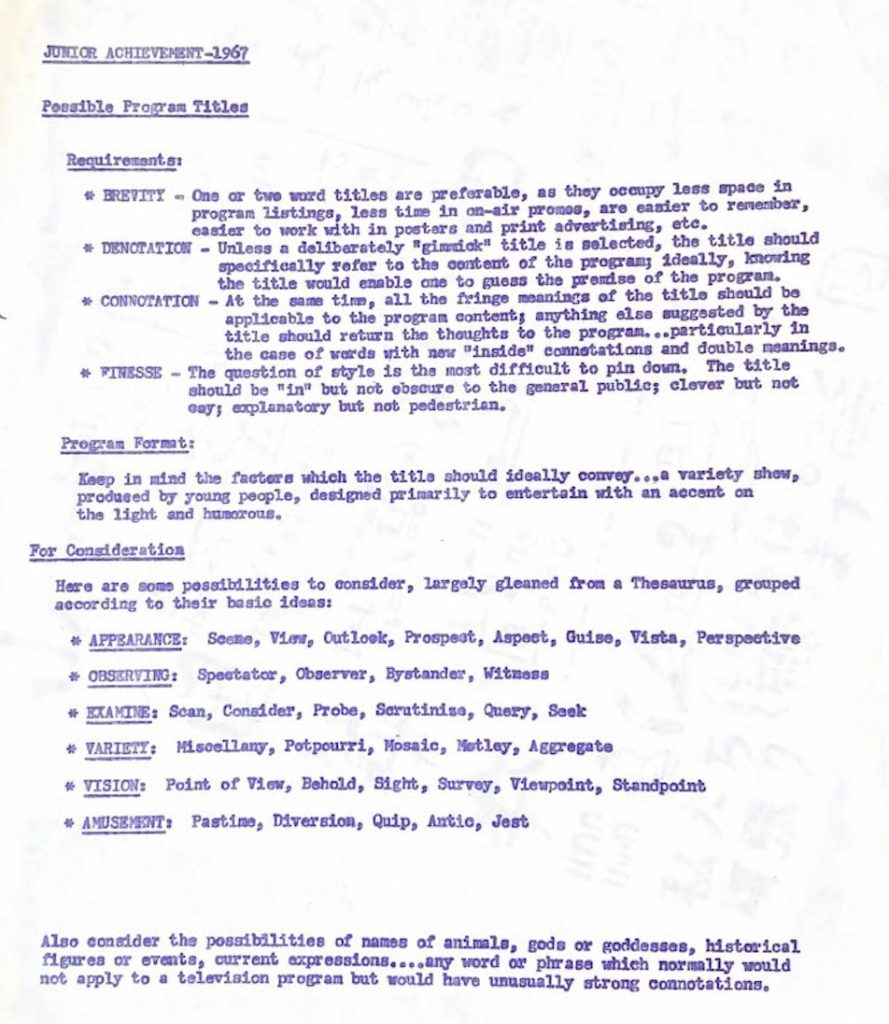
Just realized I haven’t posted in a while. A few holiday weeks off plus being buried in reading and taking notes from hundreds of documents will do that to a blog.
The documents I’m currently poring over were weekly single-page memos given the name “poop sheets” by BOC creator (and Army vet) Dave Williams, distributed to all company members across the 30ish weeks of the seasonal term. As to their function, Williams wrote at the start of the 1973-74 set: “Oftenstance, when an Achiever misses a meeting or goes into a 2-hour nod Thursday night at 7, he loses track of what the devil is going on. These weekly bulletins will help steer you in the paths of righteousness should you stray. Herein you will find announcements of meetings, special reminders, Success Hints!, typing errors, and oddments.”
Reading through these is a constant reminder of what a joy this project is for me, as both a historian and a human who is averse to boredom. In terms of the former, the poop sheets offer a treasure trove of information about each season, because Williams (and those who took over writing them after he died) meticulously detailed how things were progressing, from ad sales to production to publicity, such that you can trace out a distinctive narrative arc of progress across each season — well, usually more of a zig-zag than a neat arc. Williams describes at the end of the 1975-76 season that he used them to “congratulate, remind, philosophize, scold, amuse, announce and probably offend” as he tracked the company’s activities.
The sheets are also a tremendous testament to Williams’ ability to engage an audience stretching across the years from a 1970s teenager to a semi-senior academic fifty years later. His writing style is clever but never obtuse, and his humor is delightfully refined and silly in almost equal measure, with every sheet generating at least a few wry smiles and more than a few outright laughs. Just picking one example mostly at random from the first year’s set or I’ll never stop reading long enough to get this posted, Williams told the kids what to expect from their first attempt at selling commercial time: “Tempering somewhat that heady exhilaration which comes from walking into an Advertising Manager’s office and saying: ‘I represent WJA-TV…’ will be that magic moment when you are hurled bodily from that office with no contract” (December 11, 1967). He also skillfully highlighted well-known quotes, repeatedly using ones that seemed most germane, such as this passage written by Tom Wolfe presumably meant to point toward BOC’s love/hate relationship with the TV it ridiculed: “At the heart of every parody there is a gold ball of tribute. Even hostile parodies admit the target has a distinct voice.”
Most evidently, how much the show, the company, and the kids meant to Williams leaps off of every page, not least in the time he put into writing each sheet but most substantially in the stern yet forgiving ways in which he points out student failures. No matter how critical he was in describing how the season would be lost if the kids didn’t shape up, he was still always seeking to encourage, never to disparage. And because he was so witty, and so clearly on their side, he could call the kids out for unruly behavior without it coming across as mean-spirited, like when he wrote in March 1973 after an unproductive Saturday session: “Too much time spent on set-ups, and your little practical jokes … the cleverness of which would make you an absolute wow at any fifth grade party. (Have you tried the one where you pull the chair out from someone sitting down?).”
Williams concluded each season with a final parting thought, “much like the thoughtful mortician who checks to be sure the smile is firmly set on the corpse before he closes the lid,” he wrote in May 1976. Two years prior, he bid farewell to that season’s company with this: “It has been nearly a year since some of you walked into the interview room to face us, a recorder, a Polaroid camera and a bowl of cookies. And now, we’ve given you all that we have to give. We warned you that it would be fun, and we promised you that there would be tears, and we predicted the unpredictable. We scarred most of you psychologically … and some of you physically. We sweated, cursed, giggled, bled, threatened, apologized, sighed, cried and very nearly collapsed at times. And no one on the outside will ever understand what it’s like being on the inside.” Thanks to his prolific, expressive writing (and all the BOCers who preserved these sheets so we could read them today*), Dave Williams has at least helped me understand it a little bit.
If you’ve managed to read this far, you deserve a clip as a reward, so here’s one wherein its poop sheet apperance helped me better understand how Beyond Our Control was evolving aesthetically in the mid-1970s. In a February 1976 entry, Williams assesses a Saturday production session and laments a few sketches that were “good ideas perhaps dragged out beyond any reasonable length.” He then praises “Walsh’s Vegetables” in contrast, “with its terse, every-line-a-joke style and the visually-interesting mix of studio and film.” He continues that the lesson going forward for the show would be to produce “more short studio bits” and “more studio-film mixes and fewer long-winded pure studio bits.” I’ll have to look for how that worked in practice when I’m done with the documents and poring over video instead. In the meantime, please enjoy David Simkins as John Walsh, true vegetable lover, warning us about the sad state of endangered vegetable species. The sketch was directed by the teen David Sutton, and if you enjoy it, you have a way to reward the adult David Sutton, who became a pioneering pet photographer, author, songwriter, and builder of cigar box guitars and today could use some help.
*If you’d like to see a bunch of poop sheets, head to the BOC website and click on a season. If you want just one to see what they look like, check out the first one from the 1975-76 season. I’ll close this post out the way Williams did at the very end of that season’s poop sheets:

